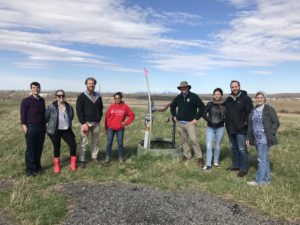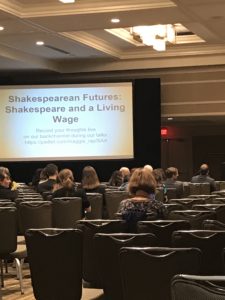
The day before I descended the #shax2019 maelstrom in DC, I took my ecotheory grad students on a trip to the ecofuture. We stood together on green grass atop a windy hill in Staten Island, looking northeast at the Manhattan skyline, and spying just a glimpse of green promise in the lady’s torch on the watery horizon. The grass we stood on itself stood on top of roughly 200 feet of twentieth-century household garbage, the refuse of Freshkills, once the largest landfill in the world, which will soon be the largest park developed in New York City in 100 years. The finished park’s 2200 acres will cover nearly three times as much space as Central Park. A plan that includes tours, outdoor activities, and art installations will reintegrate and make accessible to the public this damaged land. We stood together amid methane straws and funnels designed to leach liquid waste out from the bottom of the decomposing landfill. Is there a happier metaphor for our ecological future? A better image of things getting better in a messy world?
I kept returning in my mind to the #trashpastoral of Freshkills during my whirlwind half-week among the Shakespeareans. The comparison isn’t fair to a conference that has supported me since my grad student days almost a quarter-century ago, but the making-new and making-better parts seemed to fit what’s happening in the SAA today. Things are changing, both things we can see and below ground where we can’t. There are plenty of toxins around, in our academic and wider cultures. I’m proud to be part of an organization that’s making things better.
Triumphs of Time

[being a partial list of things the SAA is bringing toward happy fruition]
- The Wed afternoon Town Hall, which I got to a bit late, is opening up a once-secretive organization. It was great to see and hear both veteran and novice SAA-ers talk about the organization we want to be. I was particularly struck by the aplomb of our new Executive Director Karen Raber, who appears to have solved, at least prospectively, the long-running SAA conflict between religious holidays and the conference. #SAAmiracles?
- In addition to moving the SAA off the Easter/Passover cycle, the Town Hall provided the announcement of a great initiative, SAAllies, spear-headed by a quintet of inspiring scholars who want to make our organization more diverse, welcoming, and accessible. I was happy to wear the electric green lanyard, and to take part in supporting our too too SAAllied flesh as we navigate the conference spaces and beyond.
- A less visible but I hope also lasting initiative began also this year, starting via google docs and morphing into a hashtag, #shaxgrads. This group will become, in the fullness of time, a Grad Student Caucus to support and advise early career entrants into SAA’s sometimes mysterious culture. My advisee Lisa Robinson rode point on this initiative, and I feel fortunate to have been able to nudge things forward by making a dinner reservation for eight volunteers and offering stray bits of advice. I was blown away by the energy and clearness of vision of the students gathered around the table at Cuba Libre! on Th night! I look forward to great things from them.
- I’m not sure how many years the NextGenPlen has been going — maybe a half-dozen now? — but it continues to dazzle. I was blown away not just by the archival and imaginative richness of the five presentations, but also by the stage presence and authority on display. I had a brief moment of embarrassment on behalf of old bald white men during a question from the floor — but the response was so deft and thoughtful that I am now trying to convince myself the question was an intentional set up, enabling the brilliant riposte. I don’t think that’s really true — I think it was a cranky question — but the presenters handled everything brilliantly.
- I had to skip much of Friday for the happy task of taking my son to Accepted Students Day at George Washington U, so I missed Ayanna’s lunchtime talk and about half of the #ShakeRace Plenary session. I caught most of David Sterling Brown’s gorgeous and persuasive discussion of “white hands” in and beyond Antony and Cleopatra. I also heard Kim Hall’s moving and formally inventive excavation of the human suffering encoded in archival records. I’ve heard a few of her talks out of her current project on Shakespeare and African-American culture, and they have been revelatory work. We are lucky to be watching this material come together.
In mine own person
[being a more personal list of some of my conference highlights]
- Speaking on the Ecofeminism panel Sat morning with one of my grad school comrades, the chair of my own very first SAA seminar (in 1996!), and two other collaborators and colleagues was a personal highlight for me. I greatly enjoyed our discussion of collaboration and community, both in eco- and feminist contexts. I also appreciated moments in which we differ, or in which we take different directions. Difficult questions are also a form of collaboration!
- I didn’t know Christy Desmet well, but I knew her enough to miss her, and I was happy to be able to toast her memory at the Blue Bar on Friday night.
- During the before-dinner rush, I also got a phone call that made me very happy: the news that a junior member of our profession has received an offer of a tenure-track job! The scholar in question was not my student, but is someone whose work I admire and support, for whom I’ve written letters, etc. In these stormy times, good news shines a little light.
- I dragged the Ecofem gang out to the Lebanese Taverna in Woodley Park, a now-thriving eatery that was a hole in the wall when my family moved into the neighborhood in 1985, when I was just starting my undergrad days & had no glimmerings of an academic career. It’s nice to go back to old places!

And yet..
I don’t like to complain, and I am sensitive to the competing demands of time and space. But the #shaxfutures initiative is too important to have been shunted into in a Sat afternoon dual-booked slot. [Note: In the earlier language I did not mean to accuse SAA’s schedulers. I really do recognize how hard it is to schedule competing interests. It’s not an easy task, and we are trying to be better.] I had to run after the talks but before the q&a in order to catch my train, which makes me also complicit in not placing the discourse of a Living Wage at the center of my SAA. But I caught enough to know that this work needs to move into the light.
Amanda Bailey organized a great panel featuring a pair of past and present non-tt faculty from her home Uni of Maryland. Maggie Ellen Ray spoke powerfully about who gets to be a “Shakespearean,” which reminded me that I use that term to address all my students when I send them group emails, and the appellation sometimes makes them feel self-conscious. Sabrina Baron, who I’ve known since a Folger seminar on print culture we took together in the late 1990s, used Francis Bacon’s theses on bias and error to explore why we avoid facing the adjunctification crisis squarely. Amanda Bailey introduced the term “humane-ities” and provided some concrete thoughts about how be better academics, departments, and members of an academic community.
As Amanda talked about Judith Butler’s idea of up-against-ness, for which I don’t have a good citation, I kept thinking about the forces that guided this particular session in the Sat afternoon slot — near the end of the conference, in the middle of a late lunch hour, hard to get to for people (including me!) who were heading to trains & planes on Saturday afternoon, and even those who were just drawn to the gorgeous DC springtime weather.
The first time the SAA presented a #shaxfutures session was in Atlanta in 2017. That session had no concurrent session against it, and it was scheduled back-to with the conference plenary itself. (I mashed up the two sessions in my blog-recap.) This year, and also last year in LA, #shaxfutures was scheduled against a second great session and wasn’t located at the heart of things. I’m a little worried about where we locate our future.
What does it mean that we can so powerfully and collectively celebrate the moment of excruciating empathy that Kim Hall dazzled us with in her encounter with a child’s life in the archive, but don’t face the stunted careers of people who walk our campus hallways every day?
I wonder if we need to address our abiding affection for meritocracy, even when we know that’s not how the so-called “job market” works. So many the terms of praise in #shax2019 and academic culture more broadly are terms of distinction: brilliance, imagination, originality. I love those things too, but I worry about the implicit sheering-off that insists on only so many places on stage, so many “good jobs,” so many markers of value. We celebrate the stars on stage, but need also to make time & space for the majority of SAA-goers. Maybe a Melancholies of Meritocracy panel in some possible #shaxfutures?
I do love excellence in what we do, and I saw great work in the hour-ish of the #shaxfutures panel I was able to attend yesterday. But we as a community can do better to consider who gets left off our various stages.
Right around the time I had to scoot toward Union Station, Amanda introduced, I think via Butler again, the emotional challenge of adjacency, that it can be harder to feel deeply for the things near to us, as opposed to things more distant. That’s not an adequate explanation of the split of our attention at #shax2019 (and was not intended to be), and I certainly don’t think that racism or sexism or other forms of toxic behavior are in any way “distant” in our profession. But I’d like the questions of #shaxfutures, and also the questions of how the SAA can best serve its most precarious members, to occupy more of our time and our labor.
I don’t say that in any way to accuse our wonderful SAA leadership or to exculpate my own complicity. In fact, the #shaxfutures panel this week reminds me painfully of what I owe to non-tt faculty and how little I have repaid that debt. To be specific and personal: Sabrina Baron, the brilliant print historian on this year’s Futures panel, is a longtime “lecturer” at UMD (or I guess the local term is “professional track faculty”?). Sometime in the early ’00s, she helped start the Washington Area Group for Print Culture Studies, in the wake of a seminar at the Folger that we both attended. She invited me at some point later to give a talk to the group. I talked about celestial navigation and maritime orientation in Spenser, in one of the very first public talks I did as part of what has become my career-defining oceanic turn.
Because of Sabrina’s invitation, the talk caught the eye, or I guess the ear, of a then-librarian at the Folger, who asked me afterwards if I thought the Folger would “have enough of that kind of stuff” to do a maritime exhibition. I said I thought it would — and several years later that conversation translated itself into Lost at Sea: The Ocean in the English Imagination, 1550-1750, an exhibition which remains a highlight of my academic life and opened the blue door into the ocean studies wonder-world that’s defined my professional life over the past decade.
Would I have been able to launch my watery work without Sabrina’s timely invitation? Maybe, I guess — I mean, I probably would have written some of that stuff. But all of our successes, professional and otherwise, are (to borrow a term from academic labor) contingent. I benefitted greatly from Sabrina’s labor on my behalf, and I’ve never been able to pay her back. I wish that I had found some way.
Last encounters
I’ll close this blog-rumination, drafted on the northbound Amtrak while the #shax2019 twitterfeed chirps to me that the conference keeps rolling along, with one final encounter, driven by the green SAAllies lanyard. No names for this one!
In the hour before the #shaxfutures event Sat afteroon, I was tired and smalltalk-exhausted. I ate fried tofu in Chinatown and sat on a semi-secluded couch in the hotel lobby, watching the flow of roller-bags and the human billiard-collisions of Shakespeareans. A senior Shakespearean sat down next to me, and we started chatting, in a slightly tired and over-stimulated sort of way.
Then, to our surprise and pleasure, a first-time SAA-goer grad student who’d seen ourgreen lanyards on sat down with her sandwich, saying, “I don’t want to each lunch alone, can I join you?” She had noticed my nametag because I’d been part of her recent comps list. The three of us had a fantastic chat, talking about her work-in-progress on Spanish-language early modern texts set in the Americas, Ben Jonson, the conference, and how the academic world looks to newcomers. She reminded me of the #shaxgrads I’d had dinner with on Th, and I suggested she connect with them via the hashtag. I also thought about the dazzling NextGenPlen-ers. Many things are bad about the state of our profession — but the people are great.
As we, like the Freshkills Park engineers, labor to transform the toxins in our history into the green pastures of a shared future, we need to keep the people foremost in mind.
See everyone in Denver next year!